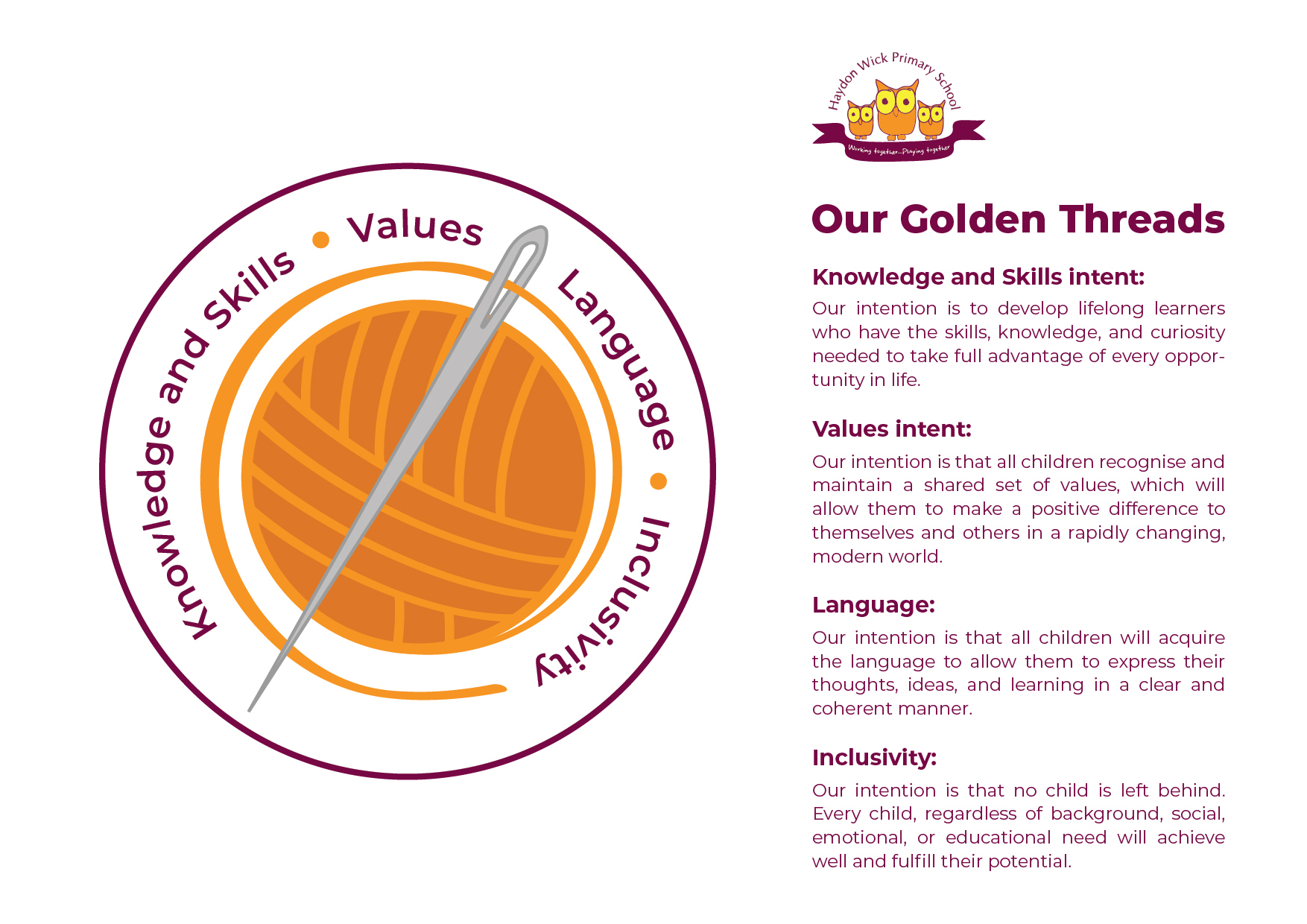Overview
We are an over-subscribed and popular primary school. Geographically, we are located on the edge of a large urban area but celebrate and promote our village school ethos and roots. We are a school that values the individual and individuality. A school where every child is given the opportunity to succeed.
At Haydon Wick, we believe in enabling every child to become the very best of themselves. Our curriculum is designed to allow children to work hard, remember more, and make a positive difference to themselves and others.
We have a book rich curriculum. As a result, our children are immersed in their learning and passionate about literature and reading. We recognise that reading is the gateway to our curriculum and strive to ensure that each child leaves Haydon Wick as confident, independent lifelong readers. Our curriculum is rich with experiential learning opportunities, it enables us to provide many themed days, educational visits, and visitors that really bring our subjects to life. We celebrate our curriculum by inviting parents into school to share in their children's learning.
Our Golden Threads

Curriculum Intent
Our Curriculum has four golden threads which are woven through all we do.
Knowledge and Skills intent:
Our intention is to develop lifelong learners who have the skills, knowledge, and curiosity needed to take full advantage of every opportunity in life.
Values intent:
Our intention is that all children recognise and maintain a shared set of values, which will allow them to make a positive difference to themselves and others in a rapidly changing, modern world.
Language intent:
Our intention is that all children will acquire the language to allow them to express their thoughts, ideas, and learning in a clear and coherent manner.
Inclusivity intent:
Our intention is that no child is left behind. Every child, regardless of background, social, emotional, or educational need will achieve well and fulfil their potential.
Diverse Learning And Dyslexia Friendly School Award
Haydon Wick is committed to supporting all children whatever their needs. As part of our commitment to recognising our diverse learners and supporting an inclusive ethos, we are working towards achieving Swindon Dyslexia Friendly Schools Award. Haydon Wick is continually striving to maintain and improve Dyslexia Friendly practice. As a school, we believe that a Dyslexia Friendly environment will benefit the learning of all pupils.
As part of our Dyslexia Friendly practice when marking work, teachers and staff are mindful of managing the needs and self-esteem of children with Dyslexia or anyone with Dyslexic tendencies or literacy difficulties. Where appropriate, staff will give verbal feedback as well as written feedback, celebrating effort and creativity. Teachers will exercise sensitivity in their marking, particularly in spelling and punctuation. They may only make a limited number of corrections on a piece of work to avoid generating a feeling of failure.
Consistent Dyslexia Friendly practice will ensure all children are given the opportunity to succeed despite any learning difficulties or challenges.
The Early Years Foundation Stage (Reception)
The foundation stage makes a crucial contribution to children’s early development and learning.
We provide children with a rich variety of teaching and learning experiences that are appropriate to their needs. The foundation stage is about developing key learning skills, such as listening, speaking, concentrating, persistence, and how to work and co-operate with others.
The early learning goals that make up the foundation stage curriculum are:
The Prime Areas
- Communication and language
- Physical development
- Personal, social, and emotional development
The Specific Areas
- Literacy
- Mathematics
- Understanding the world
- Expressive arts and design
The outdoor environment is also a very special part of the foundation stage curriculum. As such, time spent utilising outdoor areas is carefully planned for and available each day. This includes utilising the specially equipped outdoor area available to our reception classes.
The teaching to achieve these early learning goals will be delivered through first-hand experience and structured play. The areas of experience are linked to the foundation stage curriculum.
Assessment of development and learning needs are ongoing throughout the school year, and the teacher will keep records of children’s experiences and attainments.
During term 1, the teacher will carry out a baseline assessment for every child. This will establish where they are in all aspects of their learning and development and help future planning. The results of this early assessment will be shared with parents at the parents’ evening in term 1. By the end of the year, the teacher will have built up an accurate profile of each child’s development.
Curriculum Policies in a Nutshell
Key Stages 1 & 2
The core curriculum at key stages 1 and 2 comprises:
- English
- Mathematics
- Science
Children also study the subjects below, called foundation subjects, as part of the national curriculum:
- Computing
- Art and design
- Design technology
- History
- Geography
- Music
- Physical education
In Key Stage 2, pupils are taught French as well as personal, social, health, citizenship, education, and British values.
English Appendixes
Religious Education
Religious education is provided for all children as part of the curriculum and in accordance with the local authority’s agreed religious education syllabus.
Assembly is an important part of the school day, during which we meet together as a community. It is a time when we place emphasis on the development of values and attitudes towards each other and the world around us. Assemblies are non-denominational, and although they are of a broadly Christian nature, due consideration is given to the multicultural society in which we live.